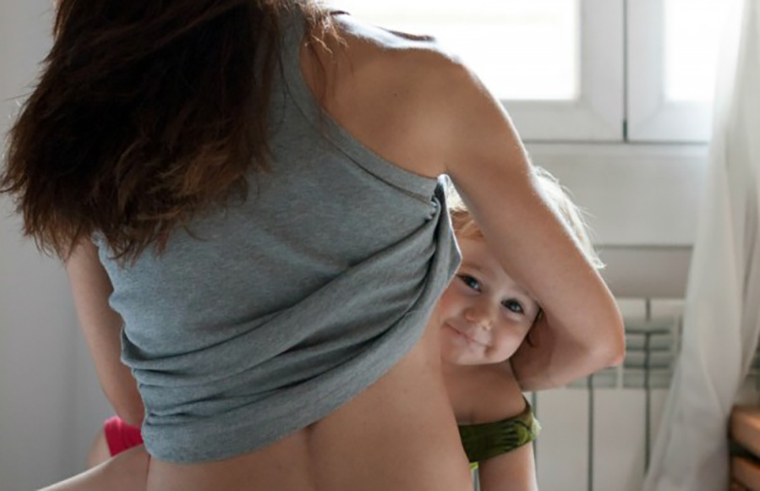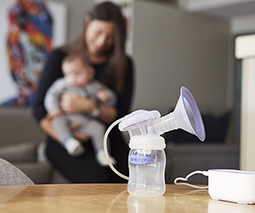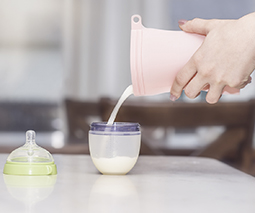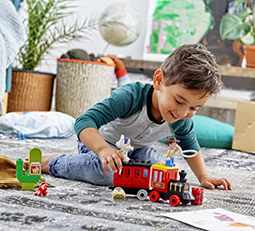6 tips to help mums choosing to breastfeed into toddlerhood

Breastfeeding can be a rollercoaster ride for even the most experienced mums. Getting through the first year of ups and downs is one thing but choosing to breastfeed your little one into toddlerhood is not without its challenges too.
The exhaustion you felt breastfeeding a newborn every two to three hours could even start to pale in comparison to the frustration of trying to tame a toddler at feeding time.
We’ve compiled a list of some of the most common challenges mums face when trying to breastfeed their toddler and some helpful tips to get you through.
1. Cheeky bad habits
Toddler antics such as twisting, pinching, tugging and even – dare I say it? – biting, can make breastfeeding such an active little one a huge challenge. While you want to try and stop this cheeky behaviour before they become habit, it is often easier said than done. Be firm and clear that hurtful behaviour is not okay, just as you would if your toddler were pinching or biting someone else. You can also try redirecting the mischievous moments towards a toy they can fiddle with while feeding.

2. Nipple care
Sore or cracked nipples are a painful fact of life for most mums on their breastfeeding journeys. Toddlerhood is when the bulk of first baby teeth generally arrive, meaning continued breastfeeding will require periods of adjustment for both mum and bub. To avoid any major incident, try to limit the amount of distractions that could cause your toddler to suddenly move their head while they are mid-feed.
The Australian Breastfeeding Association recommends offering the less sore side first and adjusting feeding positions until you find one that is comfortable. After feeds, they also recommend massaging a few drops of your milk into the nipple and allowing them to dry. Nursing pads should also be changed regularly.
3. Timings
Mum-of-three and International Board Certified Lactation Consultant, Kelly Bonyata runs parenting website KellyMom, and she explains it is normal for breastfeeding sessions to get shorter as baby gets older and it isn’t necessarily a sign that they are readying to wean. She says toddlers become master feeders, getting the milk they want in a shorter amount of time.
With this in mind and a toddler’s tendency to get distracted, she says it is normal for feeds, especially during the day, to only last a few minutes at a time. At other times, Kelly says toddlers will feed longer because breastfeeding is as much about comfort as it is about nutrition.
4. Balancing food and breastfeeding needs
The Department of Health Australia recommends solid foods be introduced to children by six months but not before four months. It also encourages breastfeeding to continue as solids are introduced “as it may reduce the chance of baby developing food allergies”.

By the time your little one is a toddler, there is no doubt their nutritional needs have grown beyond what your breastmilk can provide but your milk still remains nutritious, according to the Australian Breastfeeding Association. It is normal to find the amount of breastfeeds drop, so don’t be disheartened and instead use the time you do feed as a well deserved rest period for you, and much-needed quiet time for your little one.
5. Dealing with judgement
Everyone has an opinion when it comes to breastfeeding, from the appropriate time and place for feeds to the right age for children to be weaned. The more you can shut out those opinions and focus on the only two people who really matter in this decision – mum and bub – the happier you will be. Thankfully, while many critics still remain, there has been a tidal wave of change in public opinion and breastfeeding mums no longer stand alone.
6. Breast refusal
Raising Children Network explains breast refusal is often just a phase children go through. Perhaps they have a cold, or you’re having hormonal changes (possibly during your period) affecting the taste of the milk, or they might be overtired or overstimulated. These roadblocks do not mean you have to give up breastfeeding. Instead you could change up your routine by trying a new feeding position, or time the feed after your toddler’s bath so they are nice and relaxed.
Happy breastfeeding and keep up the great work, mamas!









